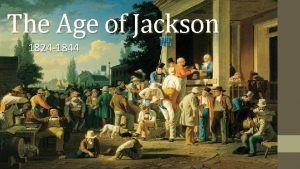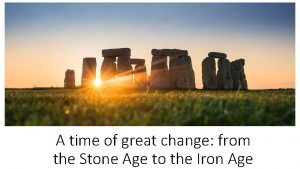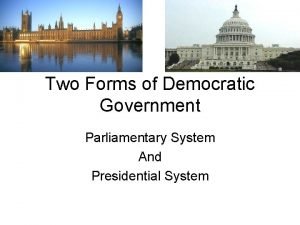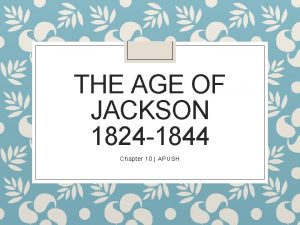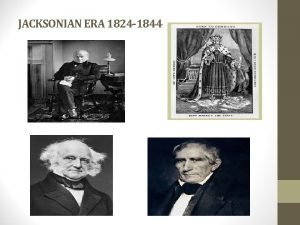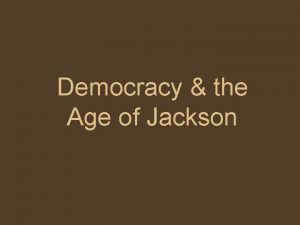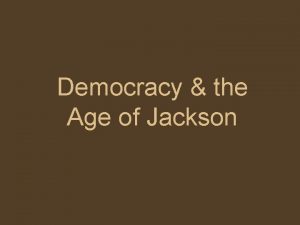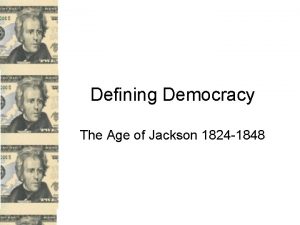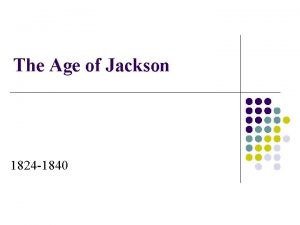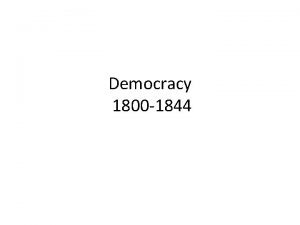1824 1844 The Age of Jackson Jackson Democracy











- Slides: 11

1824 -1844 The Age of Jackson

“Jackson Democracy” The United States developed the world’s first modern mass democracy and celebrated a new national culture, while Americans sought to define the nation’s democratic ideals and reform its institutions to match them.

Politics The new 2 party system DEMOCRATS WHIGS Local rule Limited gov’t Free trade Economic opportunity Oppose monopolies, National Bank, and tariffs - Low prices on land - Base of support: southerners, westerners, small farmers and urban workers - - Oppose immorality and crime Anti-immigrant Favor the American System Base of Support: New Englanders, upper Western states, “Old English” Protestants, middle and upper class professionals Resembles the Federalist Part y

Politics � Politics of the Common Man Universal white male suffrage More elected offices Party nominating conventions Voters begin to choose presidential electors (previously state legislatures had done it)

Politics �Election of 1828: Personal attacks, smears, “mud slinging” Massive participation resulted from change in state laws and massive campaigning

Politics � Jackson initiated the spoils system and rotation of officeholders

Politics �Jackson’s Bank War

Sectional Crisis? What’s this document referring to? � “We, therefore, the people of the State of South Carolina in Convention assembled, do declare and ordain…That the several acts and parts of acts of the Congress of the United States, purporting to be laws for the imposing of duties and imposts on the importation of foreign commodities…and, more especially…[the tariff acts of 1828 and 1832]…are unauthorized by the Constitution of the United States, and violate the true meaning and intent thereof, and are null, void, and no law, nor binding upon this State, its officers or citizens. …And we, the People of South Carolina…Do further Declare that we will not submit to the application of force, on the part of the Federal Government, to reduce this State to obedience; but that we will consider the passage, by Congress, of any act…to coerce the State…to be null and void, inconsistent with the longer continuance of South Carolina in the Union…” � South Carolina Ordinance, 1832 What event had established this precedent?

Politics �Jackson’s Nullification Crisis Tariff of Abominations Webster-Hayne Debate Force Bill Henry Clay orchestrates a lower tariff in Congress

Politics �The Removal of Native Americans to the West, 1820– 1840 Maps/Fi gs/Table s, 1– 10

Democratic Judicial Decisions CHARLES RIVER BRIDGE V. WARREN BRIDGE (1835) COMMONWEALTH V. HUNT (1842) � The Supreme Court (Chief � The Massachusetts courts Justice Taney) ruled against a monopoly, which expanded opportunity for the common man rules that unions and strikes were legal, supporting the rights of the common laborer
 The age of jackson 1824-1844
The age of jackson 1824-1844 The age of jackson 1824-1844
The age of jackson 1824-1844 The romantic age (1798 to 1824)
The romantic age (1798 to 1824) The romantic age (1798 to 1824)
The romantic age (1798 to 1824) Iron age bronze age stone age timeline
Iron age bronze age stone age timeline Iron age bronze age stone age timeline
Iron age bronze age stone age timeline Presidential system of government
Presidential system of government Mensagem dos 3 anjos
Mensagem dos 3 anjos Prantsuse poeet 1844-1896
Prantsuse poeet 1844-1896 Joint stock companies act 1844
Joint stock companies act 1844 1844 1910
1844 1910 Prantsuse poeet 1844-1896
Prantsuse poeet 1844-1896
